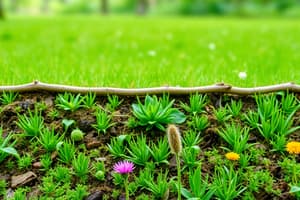Podcast
Questions and Answers
Who is often referred to as the 'Father of Botany' for his studies on plant ecology and classification?
Who is often referred to as the 'Father of Botany' for his studies on plant ecology and classification?
- Ernst Haeckel
- Charles Darwin
- Carl Linnaeus
- Theophrastus (correct)
Which scientist developed the system of binomial nomenclature, influencing the study of biodiversity?
Which scientist developed the system of binomial nomenclature, influencing the study of biodiversity?
- Arthur Tansley
- Frederic Clements
- Carl Linnaeus (correct)
- Alexander von Humboldt
What significant contribution did Alexander von Humboldt make to the field of ecology?
What significant contribution did Alexander von Humboldt make to the field of ecology?
- Studied relationships between species and habitats
- Pioneered biogeography and species distribution studies (correct)
- Developed theories of ecological succession
- Coined the term 'ecology'
Which of the following individuals formalized ecology as a distinct scientific discipline by coining the term in 1866?
Which of the following individuals formalized ecology as a distinct scientific discipline by coining the term in 1866?
What is the primary focus of Eugenius Warming's published work 'Plantesamfund'?
What is the primary focus of Eugenius Warming's published work 'Plantesamfund'?
Which scientist introduced the concept of the 'ecosystem' as a model for studying ecological interactions?
Which scientist introduced the concept of the 'ecosystem' as a model for studying ecological interactions?
Which of these scientists is recognized for linking ecological processes with evolutionary biology?
Which of these scientists is recognized for linking ecological processes with evolutionary biology?
Who is known as the 'Father of Modern Ecology' due to their emphasis on quantitative ecology and niche theory?
Who is known as the 'Father of Modern Ecology' due to their emphasis on quantitative ecology and niche theory?
Flashcards
Binomial Nomenclature
Binomial Nomenclature
A scientific way of naming organisms using two names: genus and species.
Ecology
Ecology
The study of how living things interact with their environment.
Ecosystem
Ecosystem
A community of living organisms interacting with their non-living environment.
Ecological Succession
Ecological Succession
Signup and view all the flashcards
Species Distribution
Species Distribution
Signup and view all the flashcards
Plant Ecology
Plant Ecology
Signup and view all the flashcards
Biogeography
Biogeography
Signup and view all the flashcards
Species Relationships
Species Relationships
Signup and view all the flashcards
Study Notes
Key Figures in the Development of Ecology
-
Theophrastus (371–287 BCE): Often called the "Father of Botany," he studied plant ecology and classification, laying a foundation for understanding ecosystems. His work on Historia Plantarum is significant.
-
Carl Linnaeus (1707–1778): Developed binomial nomenclature for naming organisms, highlighting species relationships with habitats. His system profoundly impacted the study of biodiversity and ecosystems.
-
Alexander von Humboldt (1769–1859): A founder of biogeography, he explored how climate and geography affect species distribution. His Kosmos integrated geographical and biological principles. He was a pioneer in ecosystem-level thinking, considering species-environment interactions.
-
Charles Darwin (1809–1882): While famous for evolution, his work on ecological interdependence and adaptation in On the Origin of Species linked ecological processes with evolutionary biology.
-
Ernst Haeckel (1834–1919): Coined the term "ecology" in 1866, defining it as the study of organisms' relationships with their environment, formalizing it as a distinct scientific field.
-
Eugenius Warming (1841–1924): Published Plantesamfund, one of the first texts on plant ecology, focusing on plant communities and their adaptations to environments. A cornerstone in the study of plant communities.
-
Arthur Tansley (1871–1955): Introduced the concept of the "ecosystem" in 1935, describing the interactions between organisms and their physical environment. His model is a core aspect of ecological research.
-
Frederic Clements (1874–1945): Developed theories of ecological succession, suggesting that plant communities evolve toward a stable climax community, advancing the study of vegetation dynamics.
-
G. Evelyn Hutchinson (1903–1991): Known as the "Father of Modern Ecology," Hutchinson stressed quantitative ecology and niche theory, significantly influencing modern ecological modeling and analysis.
Studying That Suits You
Use AI to generate personalized quizzes and flashcards to suit your learning preferences.




